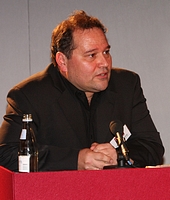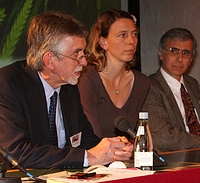www.feedingtheworldconference.org
Notes from the presentation
 Professor Jack Heinemann from the University of Christchurch, New Zealand, a lead author on the IAASTD Report, told the Feeding the World Conference about the experiences of oilseed rape (canola) growers in Canada.
Professor Jack Heinemann from the University of Christchurch, New Zealand, a lead author on the IAASTD Report, told the Feeding the World Conference about the experiences of oilseed rape (canola) growers in Canada.
Oilseed rape there has a mixture of herbicide resistances which arose their and which are a classic example of transgene flow from GM crops.
In the marketplace, non-GM rape can suffer a price decrease because exports from Canada have, at times, been shown to be contaminated with GM varieties, said Professor Heinemann.
Liability for this kind of contamination tends to work in two ways: a non-GM farmer found with someone’s transgene may be vulnerable to a court case for being in possession of intellectual property without having paid for it.
On the other hand, an organic farmer say, whose crop is contaminated by a GM farmer, could sue the GM farmer for any reduction in earnings due to loss of market certification.
In part, to avoid such disputes and costs, Professor Heinemann said IAASTD had promoted agro-ecology, a sustainable agriculture which would not benefit from GM crops. “At the same time, there is growing and plausible evidence of hazards to human health and the environment from GM crops.”
He went on to say that failure to contain transgenes can have human health, environmental and legal implications. Gene flow is the key environmental concern for sustainable coexistence between GM and non-GM crops.
“Risk assessment frameworks in most jurisdictions are case by case. Gene flow undermines this case by case approach because the movement of transgenes to different genetic backgrounds and species in an uncontrolled manner will result in the creation of new GMOs that have not benefited from any such assessment.”
The development of GM pharma and industrial crop plants introduces new complexities because these plants are not always intended to be safe. The track record of containment from the last 12 years or so of commercial GM crop development provides little confidence that either the biotech or the agriculture industries can keep these plants on the farm or segregate them away from the human food supply, concluded Professor Heinemann.
Agro-ecology was seen by IAASTD as being the most promising way forward for poor and subsistence farmers, he added. “These are the farmers who feed the world and these are the ones we have to worry about. The main problem for these farmers is the behaviour of the rich countries.”
“Europe, the United States and other countries have subsidised their agriculture and this prevents the development of markets for poor and subsistence farmers and reduces their income. They are being offered a technology – GM and mono cropping – coupled with particular agro chemicals which are unsuitable for their farming conditions. GM crops do not increase yield and they have not been shown to reduce the use of toxic pesticides in any sustainable ways.”


